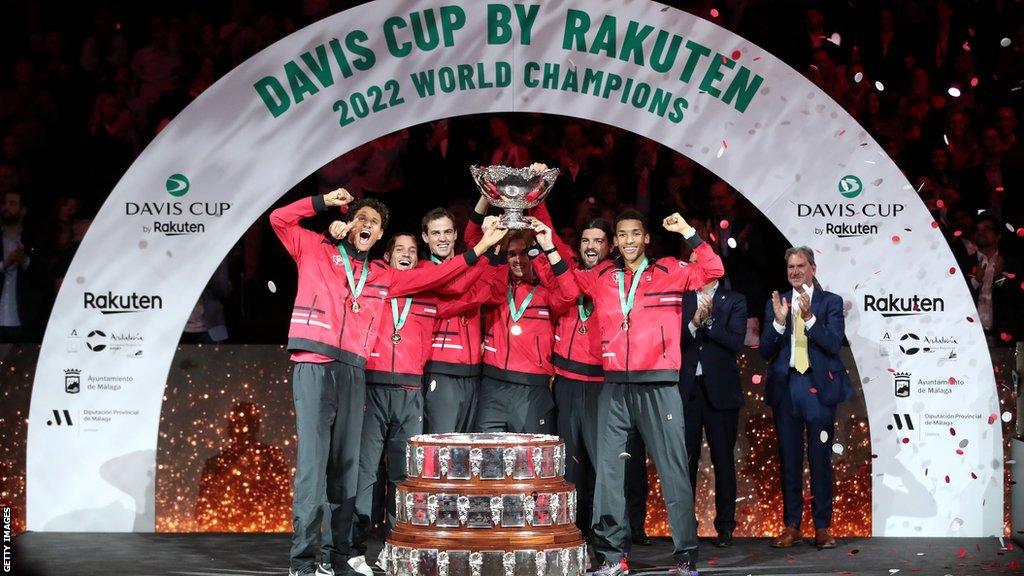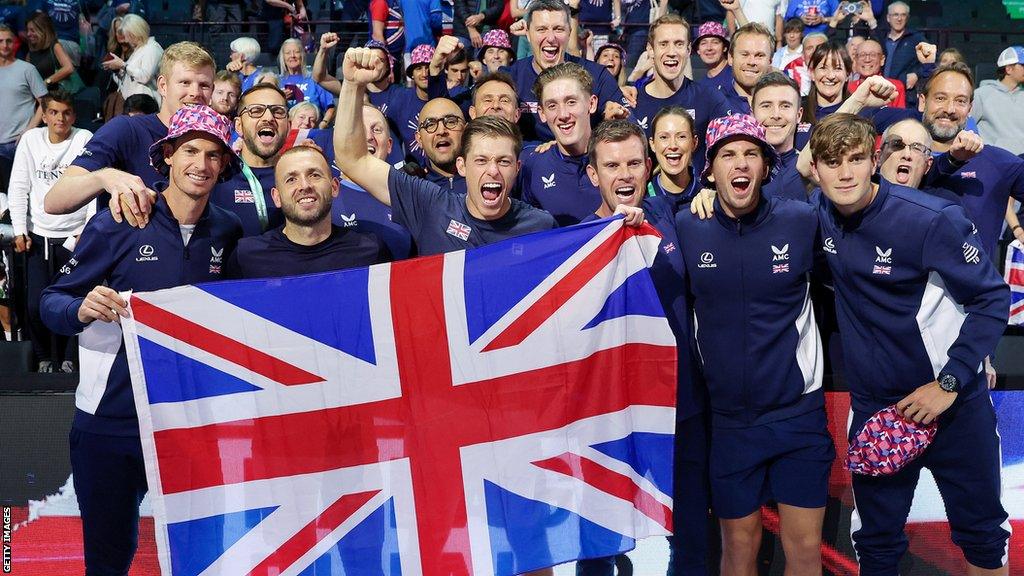Davis Cup: Could tournament return to home and away ties in the future?
- Published

Canada are defending their Davis Cup title in Malaga, Spain this week
Staging Davis Cup ties in neutral venues is like an eighth deadly sin to some - but a return to traditional home and away ties would "not work", according to the man in charge.
The route to November's Finals begins with a qualifying round in February, which is played on the home and away basis that sustained the competition until 2018.
But the last 16 is now staged in just four cities in September and the final eight are disputing the trophy in Malaga this week - and hosts Spain have not qualified.
"The home and away format is not going to work and the players told us that in the past," International Tennis Federation (ITF) president David Haggerty said in an interview with BBC Sport.
"It would not be a good competition if we went back to only home and away. Sometimes the loudest voices aren't always the majority."
Fears of a repeat of the sparse crowds seen at some of the group ties in September - most notably Switzerland against France on the opening day in Manchester - did not materialise for Finland's quarter-final against champions Canada on Tuesday.
About three quarters of the 9,207 seats were taken, mostly thanks to a spectacular effort from Finnish fans excited about watching their country's first ever quarter-final.
At least 1,000 fans flew in from home and that number was perhaps more than doubled by the numerous buses laid on by expat fan clubs across southern Spain.
The LTA says Great Britain's quarter-final against Serbia on Thursday is sold out and it knows of at least 2,500 travelling fans. The Czech Republic are also expected to bring a vocal contingent.
But for many, it will never be quite the same. World number 12 Alex de Minaur made his debut for Australia in a five-set thriller against Germany's Alexander Zverev at the Pat Rafter Arena in Brisbane in February 2018.
"In a heartbeat I would want the competition to go back to what it used to be," he said.
"I was lucky enough to get a taste of what home and away ties meant. I was able to make my debut at home in front of a packed Brisbane crowd - to this day it still gives me goosebumps.
"And then I was able to play in Austria [against 2020 US Open champion Dominic Thiem]. Everyone was against me but that was some of the coolest experiences and what made this competition so special."
Stan Wawrinka posted a video of a virtually empty stadium just before Switzerland's tie with France in Manchester in September. He also posed a question, external on X: "Did you know that ITF Tennis are paying people to support and make some noise for every country at every match?"
Haggerty confirmed that some students were paid to provide musical support to two of the teams.
"Some of the bands in Manchester… teams asked us if we could help get local university people which we put in contact with them - and it helped them with the atmosphere they were looking for," he said.
The 2024 Finals will be played to the existing format. But now the Davis Cup is an official part of the ATP Tour calendar, and the ITF and ATP have formed a "strategic alliance" to consider the evolution of the competition, a review is currently taking place to see whether any changes should be introduced from 2025.

Great Britain reached the Davis Cup knockout stages with a thrilling victory over France on home soil
One proposal which has attracted some support over the past couple of years is the idea of staging the competition over two years, with a greater emphasis on home and away ties.
Space in the calendar is at a premium, as by 2025 seven of the nine ATP Masters events will be 12 days in duration. The old Davis Cup format was played over four weeks instead of the current three.
"I think the nations are getting used to it. Fans are getting used to the World Cup concept of Davis Cup and Billie Jean King Cup," Haggerty continued.
"The Final Eight seems to be embraced and makes sense because it's a great finale."
Haggerty was at the 2014 final in the French city of Lille, where Roger Federer finally won the Davis Cup with Switzerland in front of a record crowd of more than 27,000. He accepts it was a truly special atmosphere but argues it - and other finals - did not have the impact it should have done outside the two countries involved.
"People in France and Switzerland knew that Davis Cup was taking place. Everywhere else around the world, they didn't know because it didn't have that same euphoric end to the season that we can have here in Malaga," he added.
"The majority like what we have done, and voted in favour of it. It was an accommodation to make sure that we would get top players being able to turn up and have a schedule that was reasonable."
Malaga is expected to be confirmed as next year's host city. The ITF does not rule out moving the competition away from Europe in the future, but the strength of the European nations - and the need for fans to travel to the Finals - makes a foray into a country like Australia unlikely.
And so if you are Alex de Minaur, and the format does not change, you are likely to play very few ties at home.

Life, death, crime and its victims: Step into the intense world of Britain's largest police service
'What happens when your nightmares enter your reality?' Danny Robins investigates real stories of unexplained phenomena
